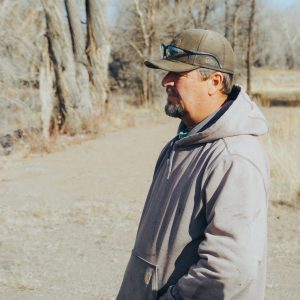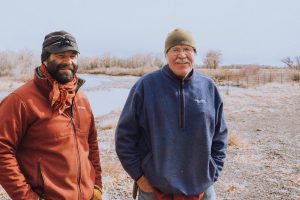Stream Management Planning & Rancher Stewardship in Colorado
Since 2017, River Network has worked to increase the number and quality of Stream Management Plans in Colorado. Stream Management Plans, or SMPs, were developed as a result of 2015’s Colorado’s Water Plan, which set goals and measurable objectives to map out the future of water management in the state. One of these objectives is that 80% of locally prioritized streams have an SMP by 2030. River Network is helping watershed coalitions meet this objective by developing guidance on best practices, facilitating a peer learning network, and providing direct support to local coalitions throughout Colorado.

“Everybody has an interest in water now. There’s a lot more fingers in the pie and it’s a lot easier to all work together to dig out the pie than it is to fight over it.” — Greg Higel, Centennial Ditch Superintendent
SMPs are data-driven assessments of river health that help communities determine how to protect or enhance environmental and recreational assets in their watershed. SMPs are accomplished by stakeholders convening to evaluate the health of their local river through an assessment of biological, hydrological, geomorphological and other data. This site-specific information is used to assess the flows, water quality, habitat, and other physical conditions that are needed to support collaboratively identified environmental and/or recreational values. To date, there are 26 SMPs that have been completed or are underway. SMPs are as much about people and communities as they are about the functional health of the river. Community and stakeholder buy-in is seen as a critical aspect of a successful SMP.
As the second-largest economic sector and the largest consumer of water in Colorado, agriculture is a key stakeholder in SMPs. In the San Luis Valley, the Rio Grande Headwaters Restoration Project has done an incredible job at engaging local farmers and ranchers in their SMP and related projects, many of whom have been farming and ranching there for generations. In a recent trip River Network staff, Mikhaela Mullins, had the opportunity to hear directly from these ranchers to discuss the deep connection they have with the land and the Rio Grande River.

Kyler Brown (left) and Thad Elliott (right)
Local ranchers, Greg Higel, Rick Davie, Thad Elliott, and Kyler Brown, shared that stewardship for the land and water has always been important to them and their families. In recent years they had wanted to make improvements to their ditches, diversion structures, and headgates but lacked the resources to make these needed improvements. When they were approached by the Rio Grande Headwaters Restoration Project about partnering on infrastructure improvement projects, they were eager for the opportunity to work together. “The river needed help, and we needed to make sure we did that right,” says Greg Higel, Centennial Ditch Superintendent. Through these partnerships, a number of ditches and related infrastructure were updated. Over time, the ranchers have been able to reduce the amount of time needed to maintain these structures and have seen water quality improve, wildlife return to their land, an increase in riparian plant diversity, and an increase in water quantity resulting in a longer season of water access. The ranchers spoke about how working with Rio Grande Headwaters Restoration Project and other conservation organizations has been a win-win-win situation for all involved in these multi-beneficial projects.

Thad Elliott with photos of the Rio Grande River from the 80’s.
In the future, River Network will continue to support watershed coalitions as they tackle important river planning and identify how it can provide benefits to farmers and ranchers. River Network looks forward to continuing to shift the conversation between conservation and agricultural stakeholders by expanding the role of agricultural organizations, such as conservation districts, to have more of a leadership role. Learn more about the work that River Network has done in Colorado in this video.
Learn more about the Rio Grande Headwaters Restoration Project at www.riograndeheadwaters.org. Learn more about the River Network Colorado Stream Management Plan program at www.coloradosmp.org.






[…] From The River Network (Mikhaela Mullins): […]